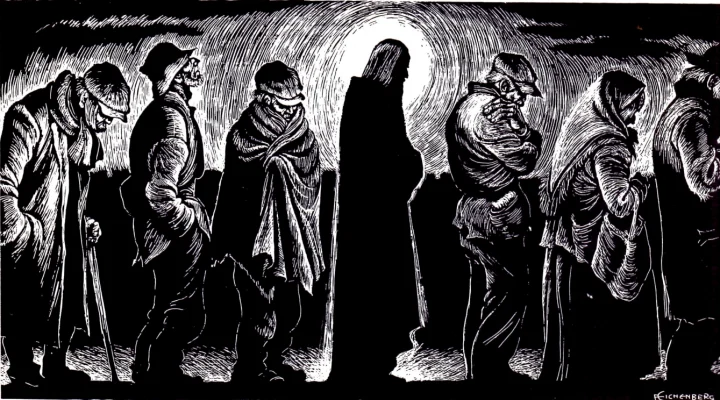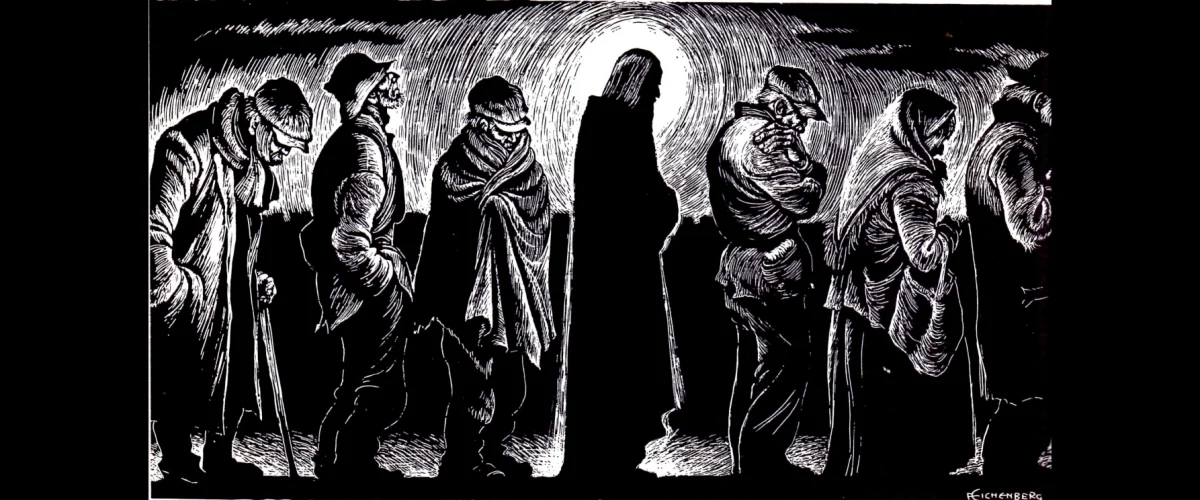Two disparate events occurred recently disturbed by normal calm. The first was the national news coverage of a revival breaking out at Asbury University in Kentucky. The second event was a social media event where Jordan Peterson wrote a post explaining to Pope Francis how Christianity works.
Peterson is a Canadian psychologist, author and media commentator. He began to receive widespread attention in the late 2010s for his views on cultural and political issues, often described as conservative.
The official Pope Francis Twitter profile tweeted: “#SocialJustice demands that we fight against the causes of poverty: inequality and the lack of labor, land, and lodging; against those who deny social and labor rights; and against the culture that leads to taking away the dignity of others.”
Peterson disagreed with the statement and wrote: “There is nothing Christian about #SocialJustice. Redemptive salvation is a matter of the individual soul.”
There was outrage on social media that Peterson would give lessons in Christianity to the pope, but that’s not what bothered me.
What I’m concerned about is what Peterson represents: An army of evangelicals who believe Christianity has nothing to do with social justice. Jordan, unwittingly, has become the “Karen” of white, racist, privileged people in the field of theology.
“If the gospel is not social, it’s unworthy of the name ‘gospel.’”
My purpose here is to juxtapose the Asbury revival with what I consider the authentic revival of the Bible — the Social Gospel. In agreement with the pope, I argue if the gospel is not social, it’s unworthy of the name “gospel.”
What’s a revival?
I confess I hadn’t thought about revivals in the evangelical sense in many years. But the Asbury revival reminded me we need a revival in American Christianity of the Social Gospel.
Lacking the theological brilliance of Jonathan Edwards, I borrow some of his skepticism about the true nature of revival. Edwards wrote: “Is the revival genuine, or is it a mere outburst of superficial emotion? Do we find empty enthusiasm backed by nothing of substance, or does the enthusiasm itself signal a major work of God? In every recorded revival in church history, the signs that follow it are mixed. The gold is always mixed with dross.”
Dietrich Bonhoeffer raised what I take to be the crux of the issue in a 1940 letter when he mused about whether “an ecclesiastical authority can be established which is grounded solely in Scripture and confession. If no such authority is possible, then the last possibility of an Evangelical Church is dead; then there is only return to Rome or under the state church, or the path of individualization, of the ‘protest’ of Protestantism against false authorities.”
There is no question that revivalism is the path of individualization.
Revivals that are dependent upon emotional appeals are exciting. Current revival strategies, however, seem intent on proving you can get people to come to church whether or not God exists. No doubt they will be successful for a time, but the “churches” that result from such revival strategies are nothing more than paganism in Christian disguise.
“The revival I pray for daily has been opposed by evangelicals since the day its primary characteristics were first proposed.”
None of this means I oppose revival. What I have in mind is a revival that goes beyond emotional, deeply moving spiritual experiences, something that cause people to rededicate their lives to Jesus. The revival I pray for daily has been opposed by evangelicals since the day its primary characteristics were first proposed.
The gospel is social
I am referring to the Social Gospel. Until the gospel becomes “social,” corporate and actually impacts poverty, racism, excessive wealth, global warming, pollution, wealth equity, no revival is worthy of the name. Any gospel that is not social has no claim to being a gospel.
As Otis Moss Jr. put it, “If you are preaching a gospel that has nothing about politics, nothing about economics, nothing about sociology, it’s empty gospel with a cap and some shoes and no body to it. It might be popular, but it’s not powerful. It might be expedient, but it’s not saving. Let me put it another way: It might be safe, but it’s not saving. God told me to tell you that we need prophets in this age where prophets are not liked.”
Evangelicals have a hundred years of attacks on the Social Gospel and counting. You can call it the “100 Years Evangelical War against the Social Gospel.” The primary villain, according to evangelicals, was and continues to be Walter Rauschenbusch, American Baptist theologian. Rauschenbusch identified the economic exploitation of the poor as nothing less than a national sin. He insisted it is not enough for churches to do charity work. It is not enough to help individuals who are afflicted; we must influence the systems that cause the affliction. For Rauschenbusch the gospel was bodily, fleshly, material.
In his revolutionary insistence on the Social Gospel, Rauschenbusch turned to the Hebrew prophets. This is always a good place to begin because the prophets were concerned with righteousness and justice. The prophets offer us a philosophical rhetoric designed to seek justice and to develop its justification. Justice and its justification are the nucleus of the Social Gospel.
“Justice and its justification are the nucleus of the Social Gospel.”
Evangelicals have wrongly accused Rauschenbusch of losing the center of the Christian faith when, in fact, he attempted to teach us the center of the Christian faith is Jubilee. The revival we need will be called a revival because it produces the first Jubilee in history.
Jubilee
Jubilee is an economic requirement for revival. The Social Gospel is the response to the primal cry of humanity that is placed on the lips of the Hebrew people when they were the slaves of the greatest symbol of economic exploitation and human oppression in history: Pharaoh.
Jubilee will come when we as a nation hear the groaning of the oppressed. No wonder that in Romans 8 the Apostle Paul boldly declares, the Holy Spirit “intercedes with sighs too deep for words. And God, who searches the heart, knows what is the mind of the Spirit, because the Spirit intercedes for the saints according to the will of God.”
Moses, the person God tabbed to respond to the groans of the enslaved, never forgot those awful cries. When Moses and those responsible for the production of Leviticus did their canonical work, they too remembered the groans and they gave God’s response to the groans in Leviticus 25 (what a great book to contain the instructions for actual revival). Moses declared it was God’s will that every 50 years you must give back to the people the land and property that is theirs that they have lost in the intense competitiveness of the market.
In Jubilee, property is returned, debts are canceled, the mad scramble to achieve the American dream stops in its tracks. Walter Brueggemann states, “Jubilee is a concrete, material, economic act.”
Jubilee is about money and property being properly shared.
“Greed is much more dangerous for the church than lust or any form of human sexuality.”
How odd this must sound to the Christians who think the Bible and the life of the church is all about sex, especially gay sex. As far as the New Testament is concerned, greed is much more dangerous for the church than lust or any form of human sexuality. How unsettling to realize the Bible is more concerned with money and property than it is with sexuality. There’s no way Leviticus 18:22 — a go-to text for anti-gay Christians — has any meaning when faced with the claims of Jubilee.
Jubilee is at the heart of the Social Gospel because God wants the little ones to have their stuff back. The sounds of the protests against injustice in our land are not the sounds of that empty, hypocritical word that slides so easily from politician and preacher lips, “wokeness.” It is the sound of the actual beginning of Jubilee.
The strict father
Evangelicals will fight against Jubilee because it’s doesn’t fit the reality they have created with their dominant metaphor, the strict father. George Lakoff, cognitive scientist, gave us this way of looking at evangelical reality. The family needs a strict father to require obedience and discipline. Mapped onto the economic practices of the nation, the strict father rewards those who work hard and punishers the slackers. No one gets anything for nothing. Authority, obedience, punishment and discipline are all part of the package.
The strict father model begins with a set of assumptions: The world is a dangerous place, and it always will be, because there is evil out there in the world. The world also is difficult because it is competitive. There always will be winners and losers. There is an absolute right and an absolute wrong. Children are born bad, in the sense that they just want to do what feels good, not what is right. Therefore, they have to be made good.
“The strict father metaphor prevents evangelicals from ever embracing Jubilee.”
The strict father metaphor prevents evangelicals from ever embracing Jubilee. It is a contradiction to everything that matters in their world. Never be surprised when evangelicals attempt to reduce the social safety net. They never would agree to cut the defense budget, but they have cut the budgets of the National Institutes of Health by $1.6 billion, the Centers for Disease Control and Prevention by about $303 million, Head Start by $400 million, disaster relief by $928 million, public housing support by about $1.74 billion, the FDA by $209 million.
They are currently hard at work attempting to cut the Food Stamp budget with false claims and misinformation about fraud. People who would take food out of a poor baby’s mouth lack empathy and will have no interest in the revival that Jubilee brings.
Any revival worth the name will start with the Social Gospel. It will be an economic revival that reverses the wealth disparity through a Jubilee of divestment. It will be loaded with empathy, caring and compassion. This is the one revival you will not want to miss.
Rodney W. Kennedy is a pastor in New York state and serves as a preaching instructor at Palmer Theological Seminary. He is the author of nine books, including The Immaculate Mistake, about how evangelical Christians gave birth to Donald Trump.
Related articles:
The Social Gospel ghosts of Rauschenbusch and Roosevelt haunt evangelicals still | Analysis by Rodney Kennedy
The true gospel is social | Opinion by Robert Sellers
Pastor seeks Southern Baptist resolution denouncing social justice


